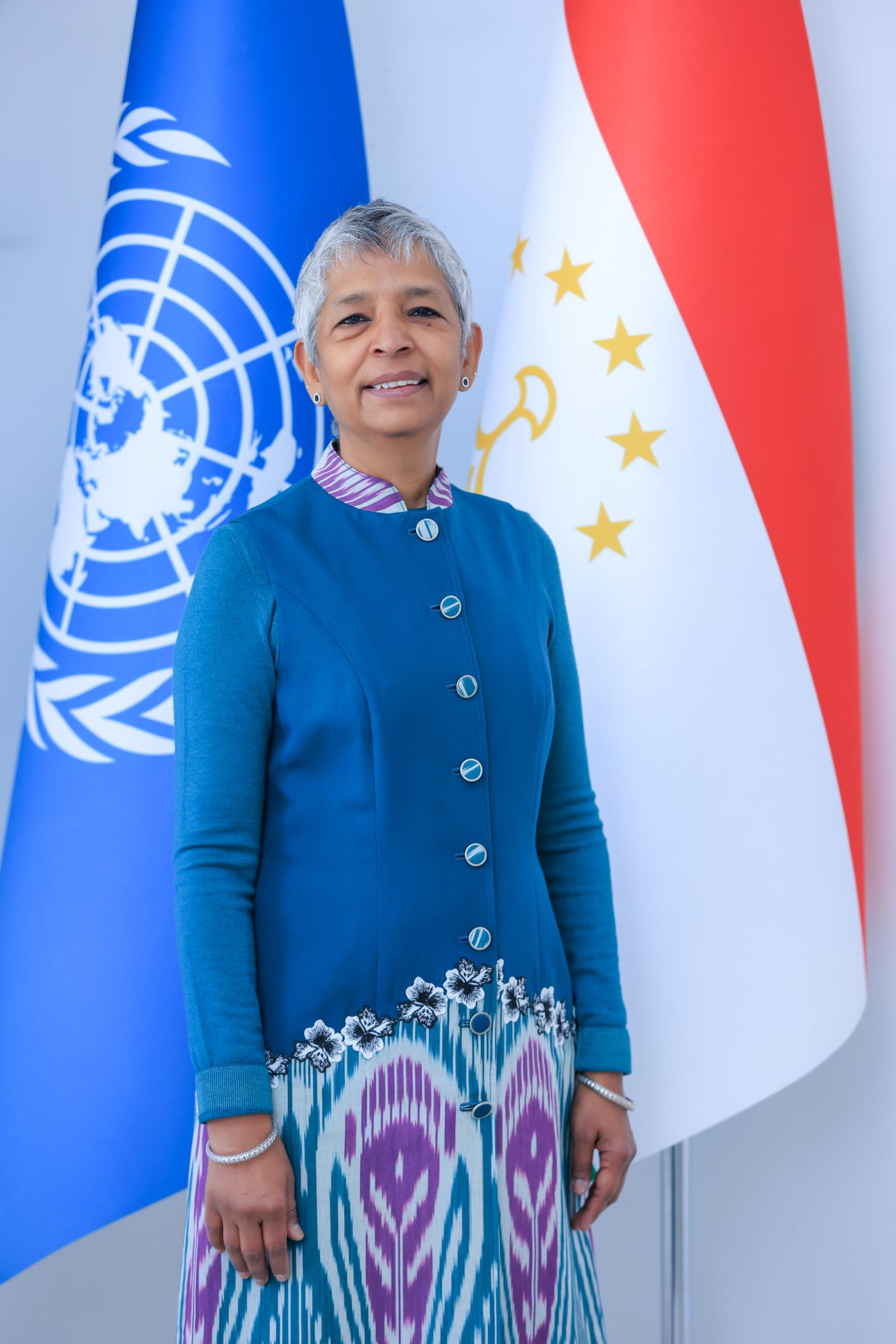UN Resident Coordinator's interview dedicated to the High-level conference on Glaciers' Preservation
28 May 2025
Ms. Parvathy Ramaswami, UN Resident Coordinator's interview dedicated to the High-level conference on Glaciers' Preservation - 2025

What are the key objectives of the upcoming High-Level International Conference on Glaciers’ Preservation in Tajikistan, and how does it aim to address the urgent challenges posed by glacial melt in Central Asia and beyond?
The High-Level International Conference on Glaciers’ Preservation is an important outcome of the initiative promoted by the Republic of Tajikistan that led to declaring year 2025 by United Nations General Assembly as “International Year of Glaciers’ Preservation 2025” along with adoption of the “Decade of Action for Cryosphere Sciences, 2025–2034.”
The Conference aims to elevate the global significance of glaciers and underscores the urgent need to halt their melting, calving, and retreat. It also seeks to advance collective efforts in addressing loss of glaciers and its far-reaching adverse impacts through scientific innovation, coherent policy development and collaborative actions.
This Conference outcomes will promote cooperation on many levels. It aspires to strengthen global partnerships among governments, scientists, civil society, and other key stakeholders, with a particular emphasis on fostering transboundary collaboration to safeguard glaciers and the lifeline they provide for the socio-economic development and benefits.
As you mentioned, Tajikistan is a vocal advocate for water and climate issues on the international stage. How does this conference fit into the broader efforts of the UN and the Government of Tajikistan to promote water management for sustainable development and climate resilience in the region?
Tajikistan is home to a vast number of glaciers that serve as critical source of water for agriculture, hydropower, and drinking water—both within the country and for downstream nations. The UN supports scientific research and data-driven assessments to better understand the impacts of climate change on the cryosphere, including glaciers, snow, and permafrost, and how these changes affect water availability and the frequency of natural hazards.
Through its mandate, the UN provides technical assistance to monitor glaciers dynamics, evaluate water resources, and assess disaster risks. It also helps develop strategies for sustainable water management, climate change adaptation, and disaster risk reduction. These efforts are vital not only for Tajikistan but for the entire Central Asia region to manage water use sustainably today and for future generations.
The UN works in close partnership with the Government of Republic of Tajikistan to address climate change and safeguard the country's glaciers. Through tailored set of initiatives, the UN supports efforts to both mitigate the effects of climate change and strengthen Tajikistan’s resilience and adaptive capacity.
Taking a comprehensive and integrated approach, Tajikistan and UN collaborate on managing disasters, climate, and environmental risks. UN agencies assist in strengthening the coordination of disaster risk reduction (DRR) strategies and related actions. The National Platform for Disaster Risk Reduction—led by the Government—benefits from the active involvement and support of diverse national and international stakeholders and partners.
In Tajikistan, the UN works hand in hand with local communities on inclusive, practical ways for managing water and adapting to climate change. By helping people use water wisely and strengthening supply systems, UN and partners help families gain more reliable access to clean water.
The UN supports farmers with sustainable water access to grow healthy food and empowers vulnerable groups—especially women and girls, people with disabilities, youth, people, living with HIV and others — through learning and training opportunities, knowledge transfer, livelihood-appropriate assets and innovative technologies.
It means that more children are safe from disasters, they can go to school, learn and grow. Families and communities become resilient and prosper. With people at the center, the UN is helping build healthier, more resilient communities ready to face a changing climate.
With glacial retreat accelerating due to climate change, what concrete actions or commitments do you hope will emerge from this conference—both from regional governments and the international community?
The High-Level International Conference on Glaciers’ Preservation is expected to elevate the urgency of loss of glaciers as a global climate and development challenge. It aims to secure strong political commitment through a declaration, emphasizing the critical role glaciers play in water security, climate adaptation, and disaster risk reduction. The Conference will also promote scientific collaboration, open data access, and enhanced investments in glaciers monitoring and research.
One of the key outcomes will be strengthened partnerships among governments, UN agencies, scientists, civil society, and other stakeholders. The Conference is expected to encourage the integration of cryosphere-related issues into national climate policies, disaster risk reduction strategies, and water resource management plans. It will also foster transboundary cooperation, particularly in glacier-fed river basins, and mobilize financial and technical resources to protect glaciers and ensure sustainable water use for both current and future generations.
Another benefit of the conference is improved coordination through joint plans for glaciers’ preservation and establishing practical mechanisms to monitor progress and provide technical assistance. The conference is expected to reaffirm commitments by the Governments to develop or update their national cryosphere strategies and invest in early warning systems, resilience measures, and regional cooperation frameworks. Partners, including civil society, academia, and the private sector, will play a critical role in sustaining momentum through continued advocacy, innovation, and implementation of community-based solutions.
We, as UN, remain committed to working closely with all partners to ensure glaciers are preserved as a part of comprehensive response to climate change threats and contribute to safeguarding the planet for people to live and thrive.





